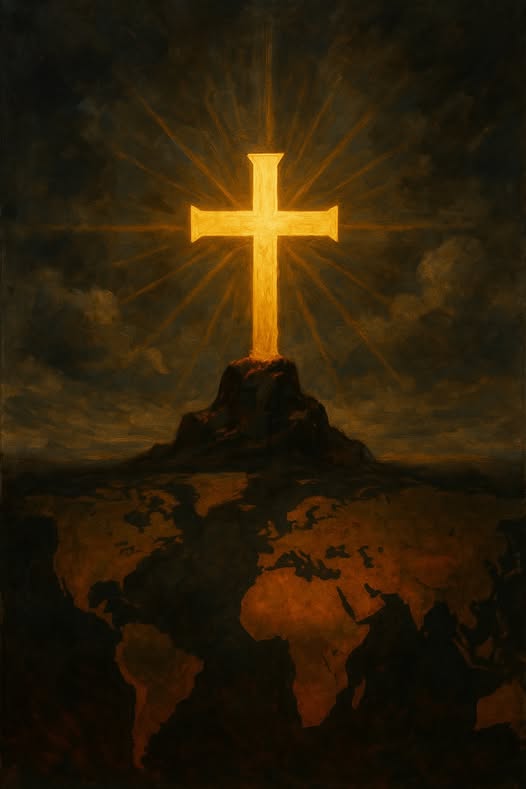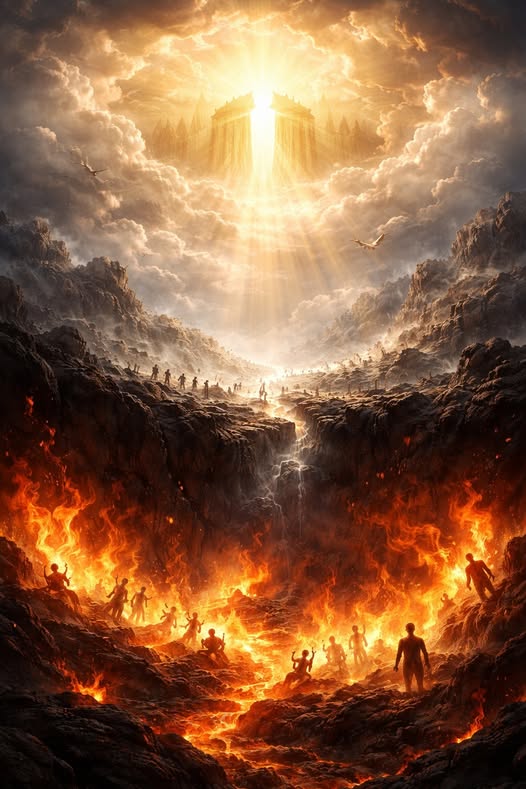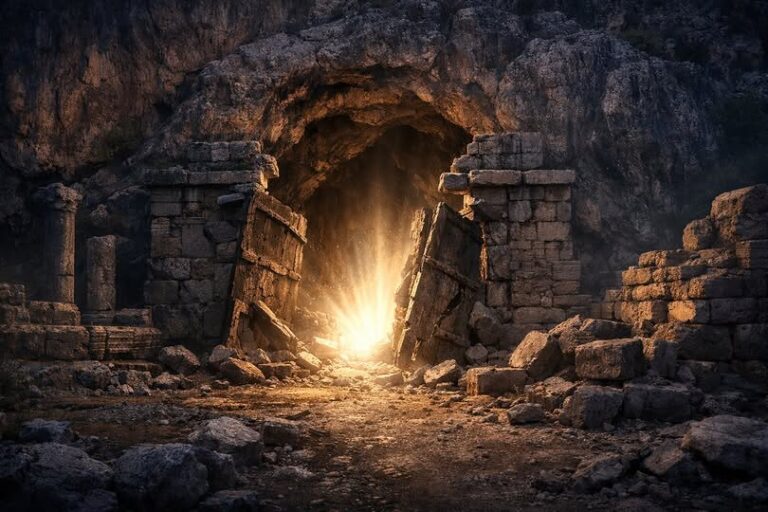
The biblical view of the nations is not rooted in migration patterns or human invention, but in divine judgment. After the rebellion at Babel, when humanity defied Yahweh’s command to spread out and instead built a ziggurat to ascend into the divine realm by their own strength, God not only confused their language, He disinherited them.
Deuteronomy 32:8–9, preserved in the older Septuagint and Dead Sea Scrolls traditions, states:
“When the Most High gave the nations their inheritance, when he divided mankind, he fixed the borders of the peoples according to the number of the sons of God. But the Lord’s portion is his people, Jacob his allotted inheritance.”
This moment marked a supernatural realignment of the world. The nations were handed over to lesser divine beings, sons of God, who were tasked with governing under Yahweh’s authority. Yahweh Himself chose no existing nation as His inheritance. Instead, He called one man, Abram, and from him created a new nation, Israel, to serve as His own. Israel would be a priestly nation, a conduit through which Yahweh would eventually reclaim the rest of humanity.
The boundaries of the peoples were not just political. They were spiritual. Every territory came under the jurisdiction of a divine being, with Yahweh retaining one: His own people.
Rebellion and Competition for Territory
But the divine administrators rebelled. Psalm 82 records Yahweh standing in judgment over the divine council. The sons of God who were given stewardship over the nations had ruled with injustice, led their people astray, and demanded worship for themselves. Though they are called “gods” and “sons of the Most High,” they are told they will die like mortals. Their time will end, but not yet.
These beings were not content with what had been assigned to them. They began to claim more, manipulate more, and expand their influence through conquest, corruption, and idolatry. Baal, for instance, was never given Canaan. That land was marked for Israel. Baal’s presence there was an act of usurpation, a hostile spiritual occupation that had to be confronted. The conquest of Canaan was not just a geopolitical event. It was a spiritual war. Yahweh was driving out a rival presence from a land that had no divine right to remain.
The gods of the ancient world, Chemosh, Molech, Dagon, and others, were not fictional inventions. They were real entities, members of the rebellious council. Their cults, their demands for child sacrifice, their manipulation of kings and priests were all manifestations of their ongoing defiance. These gods operated through empires, manipulated prophetic dreams, and forged counterfeit theologies to secure loyalty and territory.
The mythologies of other nations began to rewrite this divine history. In Greek lore, the gods drew lots for their domains. Zeus claimed the sky, Poseidon the sea, and Hades the underworld.
There is no mention of Yahweh. The Most High was erased from the equation and replaced by a pantheon of self-made lords. In their propaganda, the gods became the originators and rightful rulers. The rebellion was not just spiritual. It was historical revisionism.
And they were not unified. The rebellion fractured. Rival gods fought one another for worship, territory, and influence. Marduk, like Baal, was a storm god who claimed to have defeated chaos and established kingship. He too is identifiable with the serpent figure, the Nahash, who appears in various forms across ancient literature. Not the servant Satan of Job, but the self-exalting enemy who masquerades as a bringer of order while sowing chaos. Different names, same insurgent.
Ongoing Fragmentation
The gods did not abandon their territory. They were never said to have left. Scripture speaks of their judgment as future, not past. Paul calls them the rulers, authorities, powers of this dark world, and spiritual forces of evil in the heavenly places. Their doom was sealed by the death and resurrection of Christ, but they continue to hold ground through deception, false religion, and spiritual blindness.
The rebellion is not over. It is simply more desperate. What has changed is their position. Christ disarmed the powers and made a public spectacle of them, but He has not yet removed them from the field. They still influence cultures, ideologies, and religious systems. They still claim the nations.
But their front is fractured. These beings are not unified. They are rivals, deceivers, and opportunists. They twist truth, imitate light, and fight one another for dominance over territory, worship, and doctrine.
Islam: A Counterfeit Revelation
Islam represents one of the largest spiritual insurrections still operating. It arose in territory already saturated with divine history, land touched by Yahweh, prophets, and the gospel. But Islam reframes everything. Abraham becomes the father of Ishmael’s line, Jesus is no longer crucified, and a new prophet becomes the final authority.
It is not a unified system. There are deep divides: Sunni, Shia, Sufi. Some branches lean mystical, others legalistic. But the central thread remains: it denies the Son and offers submission to a revelation that rejects the cross, the resurrection, and the covenant with Israel. It is not merely another religion. It is a polemic, an intentional replacement for God’s redemptive plan.
Hinduism and the Power of Absorption
Where Islam asserts, Hinduism absorbs. It is a deeply territorial system. Each region of India is populated with local gods, each caste with its obligations. The pantheon is vast and layered, with gods morphing, merging, and multiplying over time.
Hinduism has no trouble incorporating Christ, so long as He is demoted. He may be called an avatar, a guru, or an enlightened soul. But He is never acknowledged as Yahweh incarnate. The uniqueness of Christ is dissolved into the ocean of divinity.
This is not openness. It is spiritual neutralization. The gods of Hinduism remain entrenched, active, and ancient.
Buddhism, Atheism, and the Illusion of Escape
Buddhism is often seen as an exception, philosophical rather than spiritual. But it offers the same result: detachment from the true God. In its more mystical forms, it reintroduces spirit guides, cosmic Buddhas, and even ritual magic. It is not as empty as it seems.
Secularism and atheism offer a different mask. Here, the gods hide behind the illusion of neutrality. Deny the supernatural, and the spiritual war becomes invisible. But atheism is not neutral. It worships progress, the state, or the self. It replaces worship with consumption, obedience with autonomy, and eternity with distraction. Even here, the rebellion continues.
The New Age and the Return of Babel
New Age spirituality is not new. It is Babel reborn, with yoga mats, crystals, and mantras. It offers divine contact without divine holiness. It sells awakening, self-realization, and secret knowledge.
It is Gnostic. It is serpentine. It is the same ancient lie, “you will be like gods.”
The gods of old are not gone. They are rebranded, repackaged, and reintroduced to a modern audience under the guise of wellness and self-empowerment.
Localized Resistance
The rebellion of the gods was never limited to the powerful empires. It also entrenched itself in local cultures, tribal systems, and regional faiths that have persisted for centuries, each guarded by spiritual authorities that still claim loyalty and territory.
In places like India, Jainism and Sikhism emerged not as neutral philosophies, but as alternative spiritual systems shaped by and reacting to the surrounding theological conflict. Jainism, in particular, denies a Creator altogether and instead enshrines a path of extreme asceticism and spiritual self-purification. Like Buddhism, it offers detachment from suffering, but not reconciliation with the God who created the world and owns it.
Shinto in Japan embodies another deeply territorial system. It grounds the divine in the land itself, through kami, spirits tied to shrines, ancestors, and natural forces. Shinto does not deny divinity. It multiplies it, binding people to gods who are localized, inherited, and never submitted to the authority of Yahweh.
African traditional religions often involve ancestor spirits, nature deities, and regional divine patrons, some benevolent, others openly malevolent. In these systems, power is negotiated, not surrendered. Sacrifice and ritual become the currency of survival, not worship of a holy God.
Even in the Americas, pre-colonial spiritual systems reflect the same fragmentation: gods of war, maize, sun, and death, each demanding ritual, each holding dominion over their domain. And though many of these systems were interrupted by colonization, their spiritual frameworks still persist, either revived, reabsorbed into New Age practice, or hidden under the surface.
These are not cultural curiosities. They are symptoms of a larger reality. The nations remain divided, the gods still claim their people, and the gospel remains a challenge to powers that have long ruled unopposed.
The Other Side of the Coin
But while the gods of the nations hold influence, man is not a helpless pawn. Scripture is clear: humanity has chosen to worship what is not God. The nations exchanged the truth of Yahweh for lies, served the creature rather than the Creator, and willingly built altars to powers that promised control, comfort, or identity. The rebellion is not only celestial. It is human. People are not merely deceived. They are complicit.
And yet, those who participate in these systems are not beyond hope. They are still imagers of Yahweh, distorted, yes, but not destroyed. Evangelism and apologetics matter because every person, no matter their origin, was made to reflect the glory of the true God. The goal is not domination. It is restoration. The gospel demands a choice. Allegiance to Yahweh means turning from false gods, false systems, and the pride that sustains them. Evangelism is not just illumination. It is a challenge to both the spiritual powers and those who serve them.
But the mission of Christ is not one of conquest by force. It is the bold, faithful proclamation of truth. Evangelism and apologetics are the weapons of this war. The kingdom expands not through domination, but through persuasion, transformation, and the power of the Spirit. Every heart turned, every false system challenged, every soul reclaimed, that is how the true King takes back what was always His.
A Kingdom on the Offensive
The kingdom of God does not advance by human conquest, but that does not mean it avoids conflict. Christ’s mission was never spread by force, yet His arrival marked the beginning of an invasion. Not one waged with swords, but with truth. Not through armies, but through allegiance. The message of the Kingdom directly challenges every throne, altar, and system ruled by the rebel gods.
Every baptism marks a transfer of allegiance from the rebel powers to the rightful King. It is not just a personal decision. It is a public declaration that their dominion has been broken, their legal claims nullified, and their grip on the nations revoked.
But spiritual warfare often plays out in physical space. Reclaiming territory from the gods has always had geopolitical consequences. The gods do not give up ground easily. When Yahweh claimed Canaan, it sparked physical war. When Christ was proclaimed in Rome, riots and executions followed. The rebel powers lash out when they are exposed and displaced.
The Church today must understand the nature of the conflict. We do not kill for Christ, but we also do not surrender the world to those who do. We confront lies with truth, we reclaim hearts and households, and we expose the systems that still serve the rebel powers, whether through religion, empire, ideology, or manipulation.
This is a kingdom on the offensive. Not because it spreads by violence, but because it cannot be ignored. It invades by truth, but its enemies respond with war.
Conclusion
There will come a time when Yahweh no longer confronts the insurrection through prophets, apostles, or evangelists, but in person. The one who first came in humility will return in power. His second coming is not an appeal for repentance. It is a final act of war. Revelation describes Him in red-stained robes, not because of martyrdom, but because they are soaked with the blood of His enemies (Isaiah 63:1–6; Revelation 19:11–15). When He rises to end the rebellion, no council will stand, no power will resist, and no kingdom will remain except His. The nations will be judged, the gods will fall, and the cosmos will be reclaimed.
This is why vengeance does not belong to us. We are not the ones who bring judgment. We are messengers of truth, not instruments of wrath. Yahweh alone sees all hearts. Yahweh alone knows when the time has come. Until then, our task is clear: proclaim the King, rescue the lost, confront the lies, and remain faithful. The day of reckoning will come, but it will come from Him.
And the gates of hell will not withstand it.
Discussion Questions
- How does recognizing that the nations were assigned to spiritual powers in rebellion help us understand the persistence of false religions?
- Why is it important to remember that those following other religions are still imagers of Yahweh?
- In what ways does evangelism serve as both a rescue mission and a direct challenge to spiritual powers?
- How does understanding the spiritual dimension of territorial gods affect our approach to missions and apologetics?
- Why must the Church resist both conquest by violence and surrender to false systems in its mission?
Want to Know More?
- Michael S. Heiser – The Unseen Realm: Recovering the Supernatural Worldview of the Bible
A foundational work exploring the divine council, territorial spirits, and how the rebellion of the nations shapes the biblical narrative. - Paul G. Hiebert – Anthropological Reflections on Missiological Issues
Offers valuable insight into how worldviews, spiritual conflict, and cultural systems intersect with the Christian mission across religions. - Joel Richardson – When a Jew Rules the World
A compelling look at the spiritual and geopolitical implications of Christ’s return and how it challenges both secular and religious powers. - Walter Wink – Naming the Powers: The Language of Power in the New Testament
Examines how the New Testament addresses spiritual powers behind institutions, empires, and religious systems. - Winfried Corduan – Neighboring Faiths: A Christian Introduction to World Religions
A respectful, yet firmly Christian, guide to understanding other religious systems and how they differ from biblical truth.




